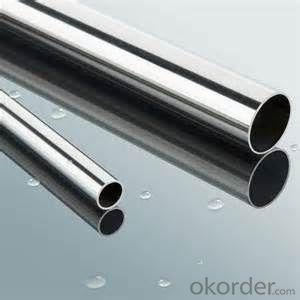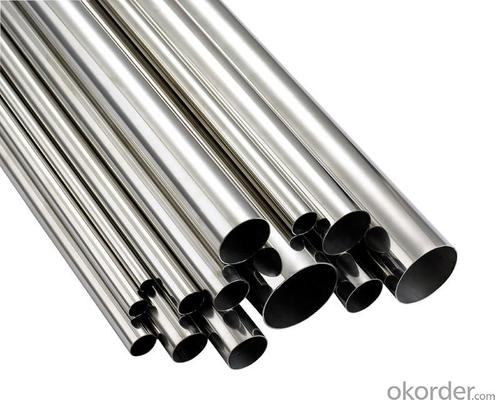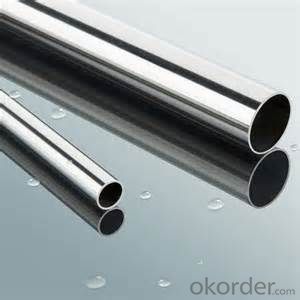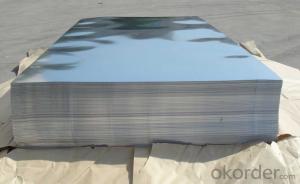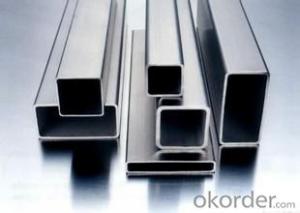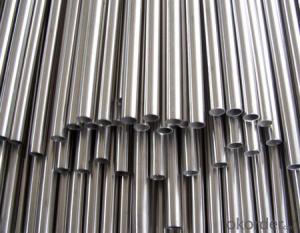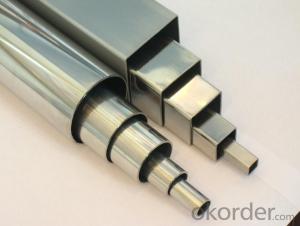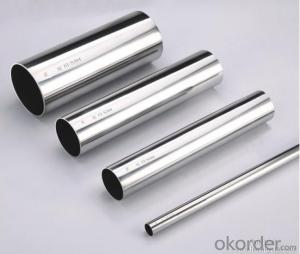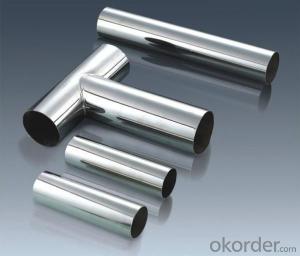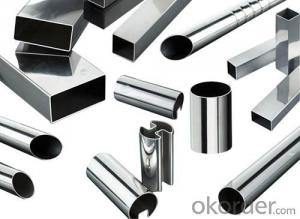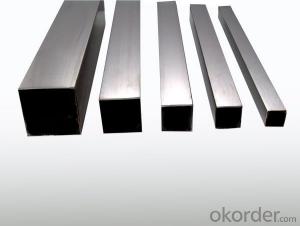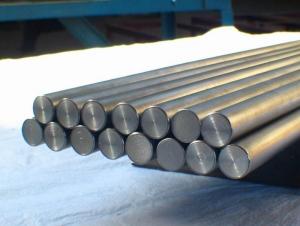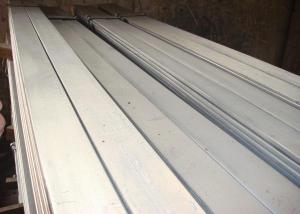STAINLESS STEEL PIPES 304L pipe
- Loading Port:
- China Main Port
- Payment Terms:
- TT OR LC
- Min Order Qty:
- -
- Supply Capability:
- -
OKorder Service Pledge
OKorder Financial Service
You Might Also Like
Description:
Stainless Steel Pipe
Material:
304 321 316 310
Packing:
In bundle
MOQ:
5 TONS
Comparison of standardized steels
| EN-standard Steel no. k.h.s DIN | EN-standard Steel name | SAE grade | UNS |
|---|---|---|---|
| 1.4109 | X65CrMo14 | 440A | S44002 |
| 1.4112 | X90CrMoV18 | 440B | S44003 |
| 1.4125 | X105CrMo17 | 440C | S44004 |
| | | 440F | S44020 |
| 1.4016 | X6Cr17 | 430 | S43000 |
| 1.4408 | G-X 6 CrNiMo 18-10 | 316 | |
| 1.4512 | X6CrTi12 | 409 | S40900 |
| | | 410 | S41000 |
| 1.4310 | X10CrNi18-8 | 301 | S30100 |
| 1.4318 | X2CrNiN18-7 | 301LN | |
| 1.4307 | X2CrNi18-9 | 304L | S30403 |
| 1.4306 | X2CrNi19-11 | 304L | S30403 |
| 1.4311 | X2CrNiN18-10 | 304LN | S30453 |
| 1.4301 | X5CrNi18-10 | 304 | S30400 |
| 1.4948 | X6CrNi18-11 | 304H | S30409 |
| 1.4303 | X5CrNi18-12 | 305 | S30500 |
| | X5CrNi30-9 | 312 | |
| 1.4541 | X6CrNiTi18-10 | 321 | S32100 |
| 1.4878 | X12CrNiTi18-9 | 321H | S32109 |
| 1.4404 | X2CrNiMo17-12-2 | 316L | S31603 |
| 1.4401 | X5CrNiMo17-12-2 | 316 | S31600 |
| 1.4406 | X2CrNiMoN17-12-2 | 316LN | S31653 |
| 1.4432 | X2CrNiMo17-12-3 | 316L | S31603 |
| 1.4435 | X2CrNiMo18-14-3 | 316L | S31603 |
| 1.4436 | X3CrNiMo17-13-3 | 316 | S31600 |
| 1.4571 | X6CrNiMoTi17-12-2 | 316Ti | S31635 |
| 1.4429 | X2CrNiMoN17-13-3 | 316LN | S31653 |
| 1.4438 | X2CrNiMo18-15-4 | 317L | S31703 |
| 1.4362 | X2CrNi23-4 | 2304 | S32304 |
| 1.4462 | X2CrNiMoN22-5-3 | 2205 | S31803/S32205 |
| 1.4539 | X1NiCrMoCu25-20-5 | 904L | N08904 |
| 1.4529 | X1NiCrMoCuN25-20-7 | | N08926 |
| 1.4547 | X1CrNiMoCuN20-18-7 | 254SMO | S31254 |
Stainless steel’s resistance to corrosion and staining, low maintenance and familiar lustre make it an ideal material for many applications. There are over 150 grades of stainless steel, of which fifteen are most commonly used. The alloy is milled into coils, sheets, plates, bars, wire, and tubing to be used in cookware, cutlery, household hardware, surgical instruments, major appliances, industrial equipment (for example, in sugar refineries) and as an automotive and aerospace structural alloy and construction material in large buildings. Storage tanks and tankers used to transport orange juice and other food are often made of stainless steel, because of its corrosion resistance. This also influences its use in commercial kitchens and food processing plants, as it can be steam-cleaned and sterilized and does not need paint or other surface finishes.
Stainless steel is used for jewelry and watches with 316L being the type commonly used for such applications. It can be re-finished by any jeweler and will not oxidize or turn black.
Some firearms incorporate stainless steel components as an alternative to blued or parkerized steel. Some handgun models, such as the Smith & Wesson Model 60 and the Colt M1911 pistol, can be made entirely from stainless steel. This gives a high-luster finish similar in appearance to nickel plating. Unlike plating, the finish is not subject to flaking, peeling, wear-off from rubbing (as when repeatedly removed from a holster), or rust when scratched.
- Q: Stainless steel welded pipe or seamless pipe expensive?
- From the brand can understand: domestic grade Cr smaller numbers are more expensive, the sum of Cr after the larger the number the more expensive, more expensive Cr symbols and so on. Foreign steel also has some rules: such as the stainless steel, the same series of numbers of bigger, longer, more expensive and more letters.
- Q: How are stainless steel pipes graded?
- The quality and suitability of stainless steel pipes are determined by various factors, resulting in their grading. The grading system takes into consideration factors such as chemical composition, mechanical properties, and manufacturing process. When grading stainless steel pipes, a crucial aspect is their chemical composition. This refers to the specific elements present in the alloy and their quantities. Common elements found in stainless steel pipes are chromium, nickel, molybdenum, and carbon. The percentage of these elements affects the strength, durability, and corrosion resistance of the pipes. Different grades of stainless steel pipes have different compositions, allowing them to be used in various environments and applications. Another factor considered in grading stainless steel pipes is their mechanical properties, including tensile strength, yield strength, and elongation. These properties determine how the pipes perform under different conditions and their structural integrity. Higher grades of stainless steel pipes generally possess superior mechanical properties, making them suitable for applications involving high pressure and temperature. The manufacturing process also plays a vital role in grading stainless steel pipes. The pipes undergo processes such as hot rolling, cold rolling, and heat treatment to shape them and enhance their properties. The quality of the manufacturing process greatly impacts the final grade of the stainless steel pipes. Pipes produced using advanced techniques and strict quality control measures are usually assigned higher grades. In conclusion, stainless steel pipes are graded based on their chemical composition, mechanical properties, and manufacturing process. These grading criteria ensure that different grades of stainless steel pipes are available to meet the specific requirements of different industries and applications.
- Q: Are stainless steel pipes resistant to chlorine corrosion?
- Stainless steel pipes have a general resistance against chlorine corrosion. The corrosion resistance of stainless steel is widely acknowledged, especially when it comes to chlorine and chlorinated water. This is because stainless steel contains high levels of chromium, which generates a protective oxide layer on the metal's surface. This layer acts as a barrier, shielding the stainless steel from the corrosive effects of chlorine. Nonetheless, it is crucial to consider that the degree of resistance to chlorine corrosion can vary based on the specific grade of stainless steel employed. Thus, it is vital to carefully choose the appropriate stainless steel grade that is specifically designed to withstand chlorine corrosion when utilizing stainless steel pipes in applications involving chlorinated water or chlorine-rich environments.
- Q: Are stainless steel pipes suitable for chemical processing plants?
- Chemical processing plants find stainless steel pipes highly suitable. Their excellent corrosion resistance properties make them an ideal choice for handling various chemicals and corrosive substances. They can resist both organic and inorganic chemicals, acids, and alkalis, ensuring the pipes' integrity and longevity in harsh chemical environments. Furthermore, stainless steel pipes offer high strength and durability, enabling them to withstand the high pressures and temperatures commonly found in chemical processing plants. They exhibit excellent heat resistance, which is crucial for handling hot fluids and maintaining chemical process stability. In addition, stainless steel pipes have low maintenance requirements and are easy to clean, reducing contamination risks and ensuring chemical purity. They are also resistant to scaling, which can affect plant operations' efficiency. Moreover, stainless steel pipes are non-reactive, meaning they do not leach or contaminate the transported chemicals. This quality is particularly important in chemical processing plants where product purity and quality are paramount. All in all, stainless steel pipes provide a reliable and efficient solution for chemical processing plants due to their exceptional corrosion resistance, strength, durability, heat resistance, and non-reactivity.
- Q: Can stainless steel pipes be coated or painted?
- Stainless steel pipes have the potential to be coated or painted, offering numerous advantages like boosted resistance to corrosion, enhanced aesthetic appeal, and heightened durability. Yet, it is essential to emphasize the significance of adequate surface preparation before applying any coating or paint to ensure strong adhesion and long-lasting results. It is also advisable to employ coatings or paints specifically formulated for stainless steel in order to preserve its inherent qualities and avoid possible complications like flaking or peeling.
- Q: Can stainless steel pipes be welded to other materials?
- Yes, stainless steel pipes can be welded to other materials. However, it is important to consider the compatibility of the materials being welded together and ensure proper welding techniques are used to achieve a strong and reliable joint.
- Q: Can stainless steel pipes be electropolished?
- Yes, stainless steel pipes can be electropolished. Electropolishing is a process commonly used to enhance the surface finish of stainless steel by removing surface imperfections and contaminants. It involves immersing the stainless steel pipe in an electrolyte solution and applying an electric current to it. This process selectively removes a thin layer of material from the surface, resulting in a smooth and shiny finish. Electropolishing is particularly beneficial for stainless steel pipes used in industries such as pharmaceutical, food processing, and semiconductor, where a high level of surface cleanliness and corrosion resistance is required.
- Q: Can stainless steel pipes be cold worked?
- Indeed, cold working is a viable option for stainless steel pipes. By subjecting the metal to deformation at normal temperatures, without any heating prerequisites, the desired outcomes can be achieved. Given the malleable and adaptable nature of stainless steel, shaping and sizing through cold working can be effortlessly accomplished. Techniques like bending, flaring, swaging, and drawing can be effectively employed to meet precise specifications when it comes to stainless steel pipes. Moreover, cold working not only augments the steel's robustness and rigidity but also renders it suitable for diverse applications in sectors such as construction, automotive, and manufacturing.
- Q: Are stainless steel pipes suitable for extreme temperatures?
- Indeed, extreme temperatures are well-suited for stainless steel pipes. Renowned for their exceptional heat resistance properties, stainless steel is a favored choice for applications involving elevated temperatures. With the ability to endure both exceedingly high and low temperatures, stainless steel pipes prove their suitability across a broad spectrum of industries, including oil and gas, chemical processing, power generation, and aerospace. The high levels of chromium and nickel found in stainless steel alloys significantly contribute to their resistance against corrosion and oxidation, allowing them to maintain their structural integrity even in the face of extreme temperature conditions. Furthermore, stainless steel pipes exhibit minimal expansion and contraction rates, ensuring their resilience against thermal cycling without any notable distortion or harm. In summary, stainless steel pipes stand as a dependable and long-lasting option for managing extreme temperatures.
- Q: Can stainless steel pipes be used for petrochemical applications?
- Certainly, petrochemical applications can make use of stainless steel pipes. The utilization of stainless steel pipes proves advantageous due to their exceptional resistance to corrosion and high temperatures, which are prevalent in the handling and transportation of diverse corrosive and high-temperature substances during petrochemical processes. Stainless steel is renowned for its capability to endure aggressive chemicals, including acids and alkalis, while also demonstrating resistance to stress corrosion cracking. Furthermore, stainless steel pipes exhibit remarkable durability and possess a prolonged lifespan, rendering them well-suited for the challenging conditions encountered in petrochemical applications.
Send your message to us
STAINLESS STEEL PIPES 304L pipe
- Loading Port:
- China Main Port
- Payment Terms:
- TT OR LC
- Min Order Qty:
- -
- Supply Capability:
- -
OKorder Service Pledge
OKorder Financial Service
Similar products
Hot products
Hot Searches
Related keywords

